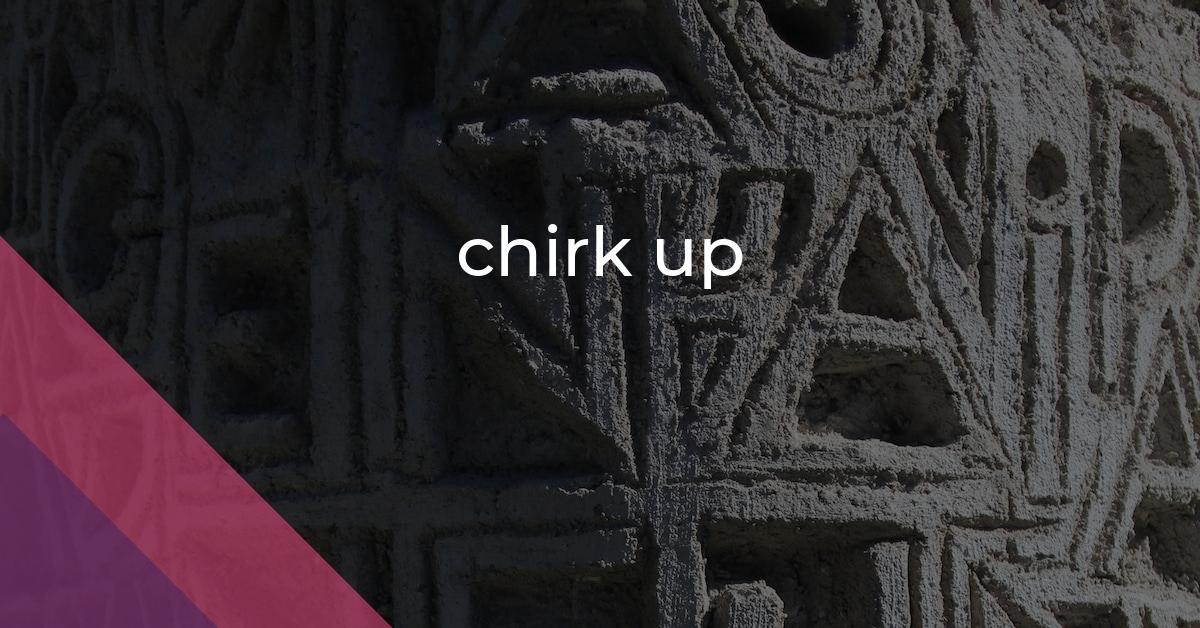chirk up: Idiom Meaning and Origin
What does ‘chirk up’ mean?
The idiom "chirk up" means to become more cheerful or happy. It is often used when someone is feeling down or sad and needs some encouragement or support to brighten their mood.

Idiom Explorer
The idiom "kick up one's heels" means to relax, have fun, or engage in lively enjoyment and uninhibited behavior.
The idiom "keep one's pecker up" means to remain cheerful and positive in difficult or challenging situations.
The idiom "keep one's chin up" means to remain cheerful and optimistic in a difficult or challenging situation. It encourages maintaining a positive attitude and not allowing oneself to be discouraged or defeated by adversity.
The idiom "juice up" means to energize or increase the power, intensity, or excitement of something or someone. It can be used in various contexts, such as charging a device, adding energy to a situation, or even enhancing performance.
The idiom "jolly along" means to encourage or persuade someone to do something, often in a cheerful or lighthearted manner.
The idiom "get up the yard" means to become angry or annoyed. It is commonly used to describe someone who becomes frustrated or irritated.
The idiom "get a rise out of" means to provoke a reaction or response from someone, usually by intentionally saying or doing something to irritate or annoy them.
The idiom "fruit up" means to enhance or make something more enjoyable, often by adding or incorporating additional elements or features. This idiomatic expression is derived from the idea of adding fruit to a dish to make it more flavorful. It can be used in various contexts, including food, experiences, or even situations that require improvement or enhancement.
The idiom *flame up* means to become suddenly angry or to intensify in a rapid and fiery manner.
The idiom "drum up" means to create or generate support, enthusiasm, or interest for something, usually through active promotion or publicity.
Instant Joy
Chirk up is an idiom that means to become cheerful or to feel better after feeling down or sad. It is a commonly used phrase in the English language, particularly in informal conversations. The term "chirk" dates back to the 14th century and originally meant "to make a chirping sound" or "to sing in a high-pitched manner." As time went on, "chirk" also came to represent being lively or cheerful.
One possible origin of the idiom "chirk up" is the connection between chirping birds and a cheerful or vibrant atmosphere. Birds chirping often indicate a pleasant and lively environment. This association between cheerful sounds and an uplifting mood may have led to the phrase "chirk up" being used to describe a person's change from feeling low to feeling more positive and energetic.
Another potential origin of the idiom can be traced back to early uses of "chirk" in literature. William Shakespeare's plays, for example, use "chirk" to describe a cheerful or lively action. In "Love's Labour's Lost," one character says, "Chirke, chirke, chirke; Ile give them all three Clowts i'th' Clack-dish." This implies that "chirk" was already associated with being cheerful or lively during Shakespeare's time.
The idiom "chirk up" became popular in the early 20th century and has since become a commonly used phrase in everyday language. It is often used as a way to encourage someone who is feeling down to become more positive or to express one's own decision to improve their mood.
Similar idioms related to "chirk up" are "chip up," "cheer up," "chum up," and "buck up." Each of these expressions involves finding ways to lift one's spirits or improve one's mood.
"Chip up" is similar to "chirk up" in that it suggests a change from a negative state to a more positive one. It can mean to become more confident or optimistic in the face of challenges. When faced with adversity, one may say, "I need to chip up and keep moving forward."
"Cheer up" is another idiom that shares a similar meaning with "chirk up." It is often used to encourage someone who is feeling down or sad to become happier. For example, if a friend is feeling upset, you might say, "Cheer up! Things will get better."
"Chum up" is a phrase that can be used interchangeably with "chirk up" to mean becoming more friendly or sociable. It can also imply forming a closer bond with someone. If someone is feeling isolated, you might say, "Let's chum up and spend more time together."
"Buck up" is yet another idiom that conveys the idea of improving one's mood or attitude. It can mean to gather one's courage or to become more determined. If someone is feeling discouraged or defeated, you might say, "Come on, buck up! You've got this!"
The idiom "chirk up" has become ingrained in the English language and is widely understood. It continues to convey the idea of shifting from a low or sad state to a more cheerful and positive mindset. Whether it originated from the cheerful sounds of chirping birds or the lively actions described in literature, the idiom "chirk up" has become a part of our everyday vocabulary, reminding us of the possibility to find solace and cheerfulness even in challenging times.
Example usage
Examples of how the idiom "chirk up" can be used in a sentence:
- After a long and tiring day, a cup of coffee always helps to chirk me up.
- The children were disappointed when the rain canceled their plans, but the promise of ice cream managed to chirk them up.
- She had been feeling down all week, but when her favorite song came on the radio, it chirked her up instantly.
More "Mood" idioms



